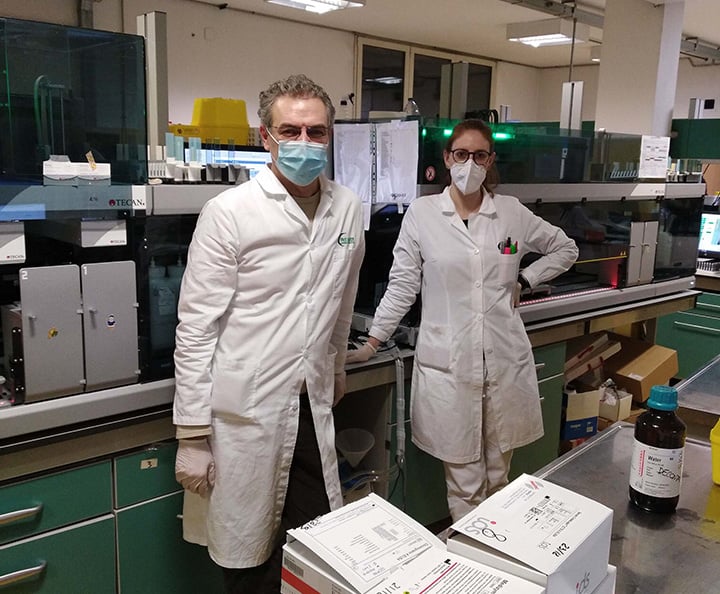Tecan uses cookies to improve our website. By continuing to browse our website, you accept our cookie policy.
Tecan uses cookies to improve our website. By continuing to browse our website, you accept our cookie policy.

Food intolerances can have a major impact on the working and social life of an individual, affecting up to 45 % of the population. Unlike allergies, where a symptom appears as soon as a certain food is eaten, intolerances – chemical reactions that occur after consuming particular foods and drinks – generally develop at a slower rate. In Italy, the Bianalisi laboratory is using food intolerance testing alongside food plans and personalized diets to help chronic sufferers take control of their symptoms.
The exact mechanisms for most types of food intolerance are unclear. Individuals can normally eat small amounts of the food without it causing any issues, but consuming greater quantities can lead to chronic problems in the intestine, for example, swelling, pain, poor food absorption, constipation and diarrhea. Sufferers may also experience a range of other diverse symptoms, including headaches, dermatological conditions (eczema) and joint pain. Common causes are enzyme deficiencies – such as in lactose intolerance, where there is an absence of lactase to break down dairy products – or sensitivity to additives or naturally occurring chemicals in foods. However, these adverse food reactions can also be IgG or IgG4-mediated primary immunological sensitivities, which are characterized by less severe responses than allergies. Bianalisi is headquartered in Carate Brianza, near Milan, with a series of additional laboratories located throughout Italy. This network of laboratories collects and transports samples to Carate Brianza for specialized testing, including for food intolerances. Gabriele Brivio, a biologist working in the medical analysis lab, explained: “For some patients it can be a simple process to work out which foods are causing symptoms, but for others it can be extremely challenging, depending on what symptoms are experienced, how quickly they appear after eating the food, and which food – or foods – is causing the problem. We normally recommend testing to people who have suffered from chronic disorders for a long time, such as malabsorption or pain.”
 Biologists Gabriele Brivio (left) and Brenna Giulia (right) working in the Bianalisi medical analysis laboratory
Biologists Gabriele Brivio (left) and Brenna Giulia (right) working in the Bianalisi medical analysis laboratory
“We first started performing food intolerance tests under a microscope about 10 years ago. While there are a number of options on the market that enable this kind of testing, we then switched to analyzing blood samples by ELISA, as the technique is very reliable. We use the IgG Food Screen Mediterranean 20, 40 and 80 ELISA kits from Tecan to screen individuals for reactions to items commonly consumed in the Mediterranean diet – the dietary model of most of our patients – which is heavily based on flour, bread, pasta, yeast and milk. This assay allows simultaneous, quantitative measurement of food-specific IgG antibodies and is performed on the Freedom EVOlyzer®. We test the blood samples by placing them in microplates, where they are brought into contact with different food allergens before adding antibodies. If a reaction occurs between the antigens and the antibodies, a color change is observed in the well. We then perform a photometric reading of each well’s color to quantify the degree of reaction to a given allergen using a calibration curve. If an intolerance is diagnosed, the patient avoids consuming that particular food for three to four weeks to ‘detoxify’ their body. After that, the food can be gradually reintroduced into the diet. Around 90 % of the positive results we see are limited to a small number of foods, including wheat, gluten, yeast, milk and egg, and it is of course very important to interpret the test results. For example, a gluten intolerance must not be confused with celiac disease, an autoimmune condition.”
[The Freedom EVOlyzer] has increased the speed of our workflow tremendously compared to how we were working before, reducing our turnaround times from 10-12 days to between seven and eight days.
“We handle around 200 samples a month – roughly 2,000-2,500 samples per year. This means our Freedom EVOlyzer system is in use every day from Monday to Friday; 10 to 12 samples are loaded onto seven plates, and it takes between three and four hours to complete the analysis. I can even load the machine in the afternoon so that I have my results by the next morning. It has increased the speed of our workflow tremendously compared to how we were working before, reducing our turnaround times from 10-12 days to between seven and eight days. It’s brilliant, because once the instrument is set up and loaded, the entire process is automated, freeing our time for the other kinds of testing we do. When you consider that we perform over 11 million tests per year at the center, this is a huge saving! And, if we do have any issues, we know that the Tecan team will always provide us with assistance within 24 hours,” concluded Gabriele.
To find out more about Tecan’s food intolerance testing solutions, visit food-intolerance-diagnostics.com
To learn more about the Bianalisi laboratory, go to www.bianalisi.it